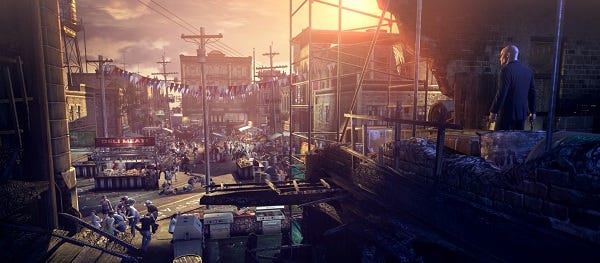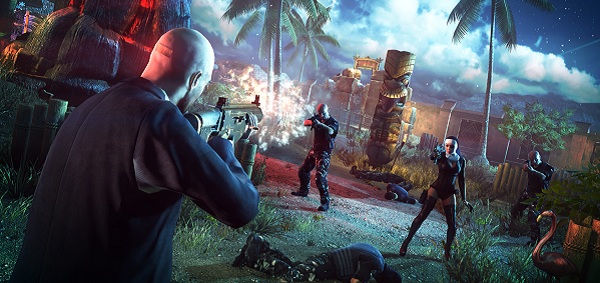Wot I Think: Hitman - Absolution
More Filler Than Killer
Absolution is the occasional freedom to be a silent killer but is also thimble-sized levels, gun-toting fetish nuns, and a prolonged and startling absence of silenced weapons. Absolution is a clever free-form Contracts mode with less hits than the New Radicals. Absolution has its priorities confused. Here’s wot I think.
What do you call a hitman who is on the run from his omniscient former employers as well as a powerful weapons dealer and every cop in the world? A fugitive, perhaps? Fugitive: Absolution would be a more honest title because 47 doesn’t do contracts anymore, at least not during the story mode, and apart from the iconic cranium and piano wire, Absolution only feels like a Hitman game in a small fraction of its compact levels. Even the moments that shine almost as bright as the excessive bloom fail to match up to the most brilliant moments of the series’ past, and there are long periods during which IO’s work operates like a less abrasive Kane and Lynch rather than a successor to Blood Money.
I think I can pinpoint the moment I accepted that I was going to be enduring the remainder of Absolution rather than enjoying it. I was infiltrating an ominous factory, guarded by an army of mercenaries, and as I ducked into a building to avoid a patrol I found a costume discarded on a table. Seconds later I was dressed as a chipmunk mascot and as I scaled the side of the building, a preposterous man in a preposterous situation, I realised I was probably supposed to be amused.
The attempt at farce felt very familiar but I was too busy to care, invisibly switching from cover to cover under the noses of unresponsive guards. Absolution had killed Blood Money and now it was trying to get away with wearing its clothes.
There are objectives in the game that involve walking through the only entrance to a room and aiming at someone’s face in slow motion. React too slowly and they shoot first and then gloat in game over scenes that you may remember from Batman’s adventures in Arkham.
The plot, although not a prequel, is a weird blend of reboot and origin story. It removes 47 from his role and sets him on a mission of revenge and rescue that will most likely leave more cops dead than killers. Because he is no longer actively working as a hitman, he doesn’t actually do ‘hits’ anymore and so requires motivation other than a paycheck, and that requires narrative, which requires dialogue, which is dreadful.
More of that later. Although the reliance on the weak story is in some ways the core of the problem, there’s also the fact that Absolution has become a stealth game rather than a Hitman game. It’s mostly about avoidance rather than blending in or surveying, and the execution of the conceptual shift is lacking.
Somebody will no doubt prove me wrong almost as soon as the game’s out, but there are a lot of levels I’d struggle to cross without killing guards. It’s certainly less tedious than waiting for them to finish their dialogue and move into a suitable position, and because most maps are so small and self-contained, the consequences are reduced. Kill every person in a courthouse and when you enter the cells beneath it, the police have no idea what just happened upstairs. There’s no continuity between one loading point and the next, even when it’s just a door. At times, 47 even loses his disguise between levels and the weapons he had gathered, even if the context of that shift was stepping out of a building and onto the street.
Silence often seems a matter of patience rather than skill. I just loaded a level to confirm a suspicion and completed it twice – once only killing the target, and once killing everyone. There are no innocents as such, just a villain and eight of his goons. Here’s how I killed them. Walked forward, shot two men, turned right, walked forward, turned left, shot two men, opened a door, went down some stairs, turned left and then killed the target and the rest of his men in a forced slow motion targeting scene.
The silent way was the same except instead of the first two instances of shooting men, I crouched behind a wall and waited for men to stop talking and turn their backs on the door I needed to go through. It’s also worth noting that during the turning and the walking forward, I wasn’t choosing a route, I was following the only one available. In that situation, my options were nothing to do with completing the level cleanly, they were about finishing a dull segment of a game as quickly as possible.
The game doesn't actively encourage the murder of guards and cops, it's just that it too often fails to make the alternatives particularly rewarding or entertaining. Apart from the chance of discovery on the larger levels, the punishment for killing innocents is a negative score, which impacts on unnecessary skill boosts.
Remarkably, most levels don’t have a target - they’re about getting from one place to another instead of hitting a man, usually while being hunted or trespassing. On the rare occasions when IO build a decent-sized, believable area and provide 47 with someone to kill, the game comes close to recapturing some of the glorious nonsense and intelligence of its former years. There are disguises, and multiple options for entry and ending. The King of Chinatown, just after the promising tutorial kill, is one of the few missions that follows a classic set up. There is a man who must be killed and 47 arrives at the area in his suit, with silenced pistols and a garrotte concealed about his person.
It was here, so early in the game, that I had hope. I was playing with possibilities, considering my options, knowing what the result must be but unsure of how I’d find my way to the conclusion. The art of assassination, so 47 has taught us, is watching, waiting and learning. This target, like so many before him, has routines, paths, and interactions with characters and environment. All of them are potential weaknesses and there are many ways to exploit those weaknesses.
Contaminated drugs will do the trick and observation might reveal the perfect disguise that will allow 47 to get close, or lure the target from his protectors. But a bullet through the head will work just as well, provided nobody knows where it came from. And if they do? Maybe you’ll survive the shoot-out or find a hiding place, a new uniform, an exit.
It’s not a very big level, but it’s thick with possibilities and, given a choice, I’d take density over scale. Chinatown was also a thrill because it felt like an escape, shrugging off the disturbingly portentous plot introduced by the tutorial. Then there are the crowds. There aren’t many of them, but when Absolution wants to make you believe you’re in the thick of the urban crush, it does it better than any game I’ve ever played. Technically, it’s an incredible achievement and although there’s nothing in later levels that’s quite as stunning as that first reveal of the city, Absolution is often remarkable to look at and it will squeeze every bit of power out of even the hardiest PC.
Sadly, it seems likely that the excesses of the engine are at least partly responsible for the size of the levels. The larger ones do take a toll on the framerate, although nudging down a few graphical options fixes things without detracting too much from the beauty of this ugly world. When maps do offer room for alternate routes and thoughtful planning they are often decent enough but several are little more than corridors. A few are corridors, even if the walls are invisible.
There are entire missions with no choice at all – walk to door, open door, perform prescribed action. One is about buying a suit and it took almost as long for the game to tally up my score at the end as it did for me to complete the level. The very fact that buying a suit doesn’t take place in a cutscene but several of the actual kills do is surely cause for dismay.
As the king of Chinatown dies, there’s a cold, creeping sensation. It’s nothing to do with questioning the ethics of the kill, even if a few innocents did die along the way – it’s the fear that the story will return. The apprehension doesn’t linger for too long though because the next mission, set in a hotel, also offers a target and a conventional opening. At this point it’s easy to think that the narrative isn’t actually lurking in the shadows, ready to pounce, but when a hit ends with a scripted failure, doubt returns like an ice cold noose.
Whatever your approach, whatever you did up to the point of the kill, it’s all flushed away in a cutscene starring a giant sack of hammers who is more Hulk than human and a 47 who screws everything up. It’s not the only time the game takes away control and forces a contrived conclusion to a hit – and for what? An escape sequence that owes more to Uncharted than Hitmen past, followed by a long run from the law. There’s a lull, several hours long, before 47 rediscovers his anonymity, and until then every mission begins with his identity known and his iconic weapons replaced by a noisy peashooter.
Disguises still work, up to a point, but anyone dressed in the same clothes as 47 will eventually recognise him as an imposter. Seeing as there are entire levels filled solely with cops, or whatever private army happens to be between point A and point B, hiding in plain sight is rarely an option. Except by using instinct, that is, in which case you can hide in plain sight until the little orange meter runs out.
Although there is a ‘purist’ difficulty that gets rid of every hint, every pointer and the x-ray, slow-mo instinct mode, many areas seem to have been designed assuming the use of all of those things. In particular, there’s a trick whereby 47 hides his face when under suspicion. While his face is covered, as long as he doesn’t run out of instinct, he will not be detected. It’s useful but it makes the AI look incredibly stupid. Sneaking through a highly secure institution, 47 is fine as long as he has cover.
Darting between one piece and the next doesn’t engage the attention of guards even if they’re looking directly at you for a second or two. If you need to cross open space, it’s time to use the instinct - place a hand to your brow and waltz across. Guards won’t react, even when you reach the other side of the room and roll behind a dustbin. Because you had your face hidden, you see, so all behaviour, except outright aggression, is perfectly permissible.
While some levels do appear to assume the necessity of instinct, in others it can bugger things up entirely. I played on hard up to a point and then switched to normal so that I could finish the final missions without constantly replaying firefights. While still on hard, with more limited checkpoints and less instinct, I made my way, silently and unseen, through a series of food stalls patrolled by elite soldiers. At the last moment before exiting the level, I was spotted and thought I’d have to replay the last ten minutes. The prospect of doing so made me reach for a bottle of bourbon, hands trembling. But then I managed to kill about thirty men and move on anyway.
I decided to replay and attempt to do things quietly and used instinct to cover my face and walk from one end of the level to the next. I used one piece of cover at the beginning, but otherwise just strolled through, undetected. This is not a level that has been balanced effectively for all difficulties, if any. I enjoy testing the limits of games, particularly sandbox murder-sims, but Absolution is more like being the one kid on the see-saw than building cities in a sandbox.
I'd prefer to pretend it didn't happen, but here are some thoughts on the story. I’ve never cared about the plot in a Hitman game. It’s never been about the ‘why’, it’s been about the ‘how’, the ridiculous and splendid possibilities offered by the playgrounds of purging. I don’t remember it well, but Blood Money’s story may be almost as poor as Absolution’s. Whether the audience was paying attention or not, IO appear to be enamoured with the mythology and agencies of their world.
What I do recall is that it certainly wasn’t as loud and it didn’t dominate the design to the same extent. Absolution’s plot, with its bizarre melodrama and ugly grindhouse excess, is the albatross around the game's slender neck. As 47 moves from Chicago to Hope and the circus of miscreants grows, the life is throttled out of the game. I could deal with apathy but it’s not that I didn’t care – by the end I actively wanted the whole sorry show to be over.
There’s a sickly insistence that 47 is doing the right thing, no matter how many bodies he leaves behind him, while the bad guys are bad because the cutscenes tell you that they are. Sex, rather than violence, is often what defines bad people in this world. 47 is essentially sexless, a purpose rather than a person, but most of the men are genitals, ‘pussies’ and ‘limpdicks’ on the whole. Most of them have a ‘perversion’ instead of a personality, whether it’s a living bondage doll with no face or voice, or a tendency to ‘get wood’ when shot.
Some women are genitals as well. I’m grateful that a scene involving sexual threats introduced me to the term ‘split-tail’. The infamous trailer-nuns do eventually make their appearance, contextualised by a throwaway line that explains them as victims of domestic abuse and other horrors, now channelling their rage as latex-clad killers for hire. So that’s good.
Maybe you’ll chuckle at the ugliness but even if it doesn’t seep through the game like pus through a bandage, there’s not a great deal of man-hitting to savour. Contracts mode - detailed here when I was much more fresh-faced and eager – is the best part of the game, surgically removed from the worst restrictions of the story, although the level design itself still suffers.
What I end up asking myself though is whether an online framework and scoring mechanisms are enough to elevate Absolution’s take on freeform killing from the joyous inventiveness of Blood Money’s finer moments. There is a spark of genius in the way that contracts are created simply by playing a level but the elegance of the system is somewhat betrayed by the scarcity of interesting locations to indulge in.
Absolution isn’t a complete failure because when it takes on the appearance and methods of a Hitman game it’s a fairly good one. I also enjoyed shooting people a lot more than I expected to – the instinct-activated slow motion targeting results in the sequential headshot equivalent of Burnout Paradise’s slow motion crashes, which is impressive the first few times and skippable the next one hundred. I also thoroughly enjoyed the absurdity of a level that actually has a switch to release pigs into minefields. The series is at its best when situations involve the confluence of the absurd and the believable, but Absolution rarely captures those moments.
The ending threatens a sequel in similar style but also promises something of a blank slate. If this were the first Hitman game I’d played, I wouldn’t want to play another, but there's just about enough in Absolution's finer moments to keep the hope alive. Remember though: it's the hope, not the hitman, that kills you in the end. As it is, I’ve already reinstalled Bloody Money as a sort of palate cleanser and I suggest you do the same.
Hitman: Absolution is out on Tuesday.


























